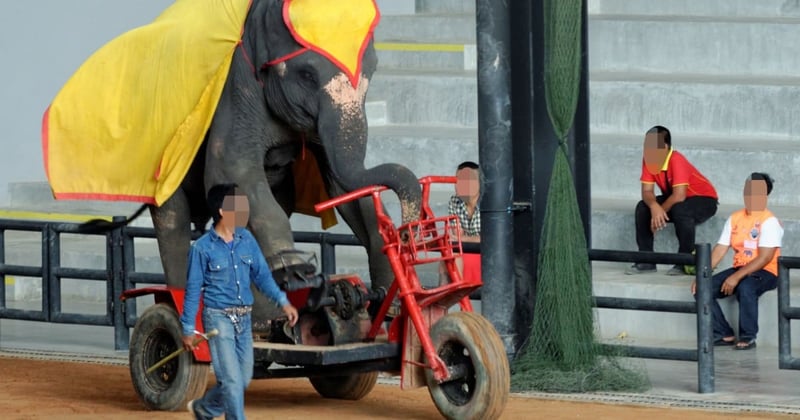
The shameful suffering caused by irresponsible wildlife tourism
Press release
A ground breaking study has found that three out of four wildlife tourist attractions involve some form of animal abuse or conservation concerns as revealed by World Animal Protection in a report launching today (Thursday, 4th February 2016)
World Animal Protection believes at least 550,000 wild animals are suffering at the hands of irresponsible tourist attractions around the world. This evidence comes from the first ever global research into the scale of welfare and conservation of wildlife tourism by University of Oxford’s Wildlife Conservation Research Unit (WildCRU) and commissioned by World Animal Protection.
Using the WildCRU research ratings and our own research and investigations in Asia and Africa, World Animal Protection has compiled a list of the ten cruelest wildlife entertainment activities across the world:
- Riding elephants
- Taking tiger selfies
- Walking with lions
- Visiting bear parks
- Holding sea turtles
- Performing dolphins
- Dancing monkeys
- Touring civet cat coffee plantations
- Charming snakes and kissing cobras
- Farming crocodiles
As tourism continues to grow, we estimate that approximately 110 million people visit cruel wildlife tourist attractions each year, unaware of the animal abuse involved.
These welfare abuses include very young animals being taken from their mothers, beaten and harmed during training to ensure they are passive enough to give rides, perform tricks or pose for holiday ‘selfies’ with tourists, with the worst venues including bear, elephant and tiger parks and a turtle farm.
WildCRU’s academic review includes analysis of TripAdvisor, the largest online tourist review site, to better understand the awareness levels of tourists visiting these wildlife venues. Of the 50,000 reviews, it revealed that 80% of people left positive reviews for venues with poor animal welfare.
Neil D’Cruze, Head of Wildlife Research at World Animal Protection says: “It’s clear that thousands of tourists are visiting wildlife attractions, unaware of the abuse wild animals’ face behind the scenes. We need to stop the demand for elephant rides and shows, hugs and selfies with tigers and lions by exposing the hidden suffering behind wildlife attractions.
“If you can ride it, hug it or have a selfie with a wild animal, then you can be sure it is cruel. Vote with your feet and don’t go.
With no global regulation regarding how wild animals are used in tourism, the big challenge is to transform the tourism industry so it is part of the solution to end cruelty to wildlife.
World Animal Protection has so far secured commitment from 87 travel companies to stop selling elephant rides and shows. Trip Advisor can also make a huge impact and we’re proposing ways they can inform tourists about the cruelty at most wildlife venues.
ENDS
Note to editors
- For an interview with a spokesperson, contact Kai Akram kaiakram@worldanimalprotection.org +44 (0) 7939 029 006 or Bev Boyle bevboyle@worldanimalprotection.org +44 (0) 7239 0563 / +44 (0) 7968 415 856
- World Animal Protection launched its campaign Wildlife – Not Entertainers in August 2015.
- World Animal Protection is building a global movement to put wildlife protection on the agenda and reduce the tourist demand for cruel animal entertainment attractions. Find out more via this link.
- World Animal Protection has secured the commitment of 87 travel companies globally to end the promotion of elephant rides and shows, including, most recently, The Travel Corporation, which includes Contiki and Trafalgar. As responsible players within the travel industry know, our first approach is always to work with industry partners to end animal cruelty.
It’s clear that thousands of tourists are visiting wildlife attractions, unaware of the abuse wild animals’ face behind the scenes. We need to stop the demand for elephant rides and shows, hugs and selfies with tigers and lions by exposing the hidden suffering behind wildlife attractions. “If you can ride it, hug it or have a selfie with a wild animal, then you can be sure it is cruel. Vote with your feet and don’t go. Says Neil D'Cruze, Wildlife Technical Expert